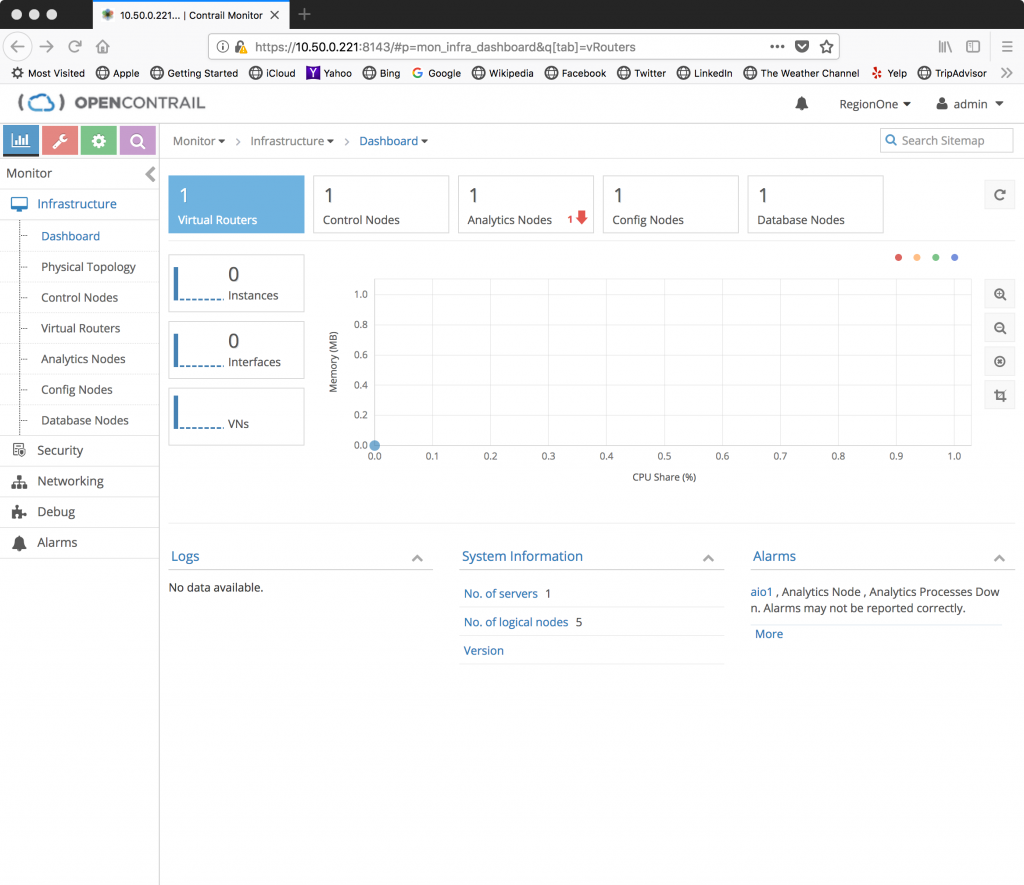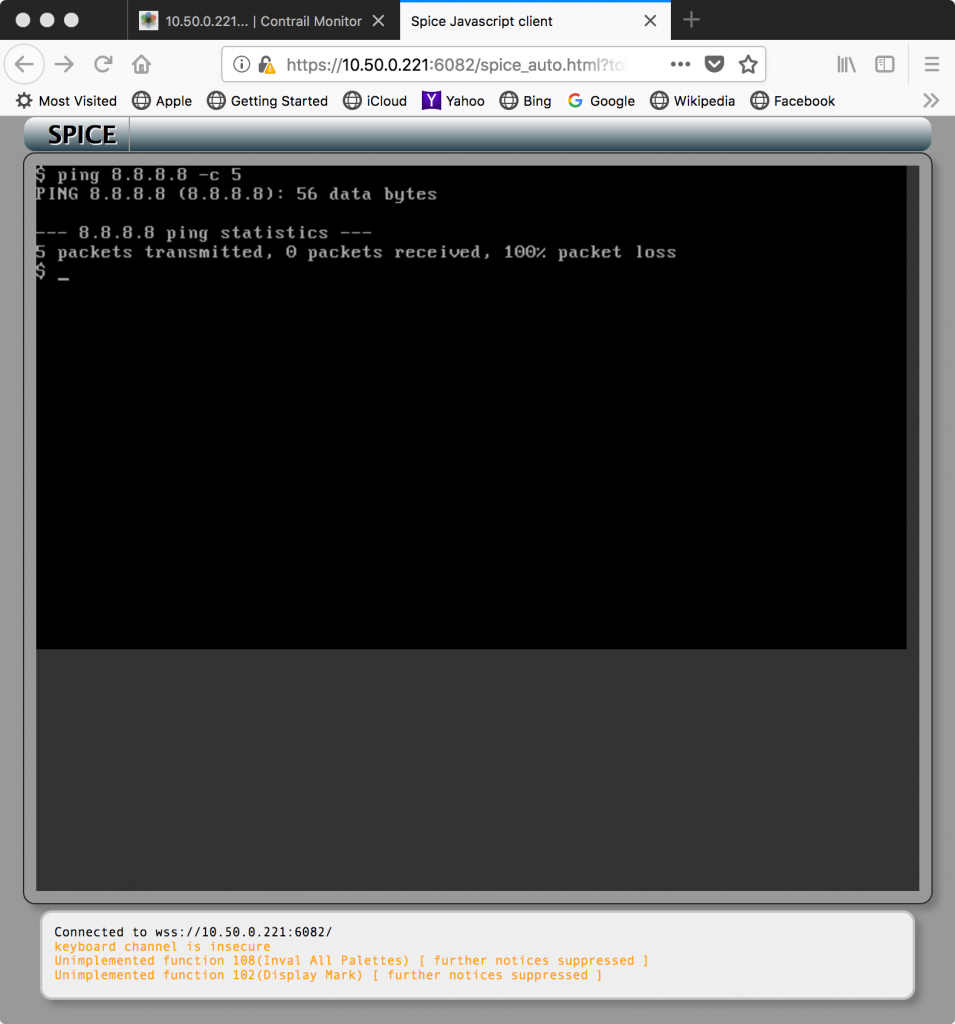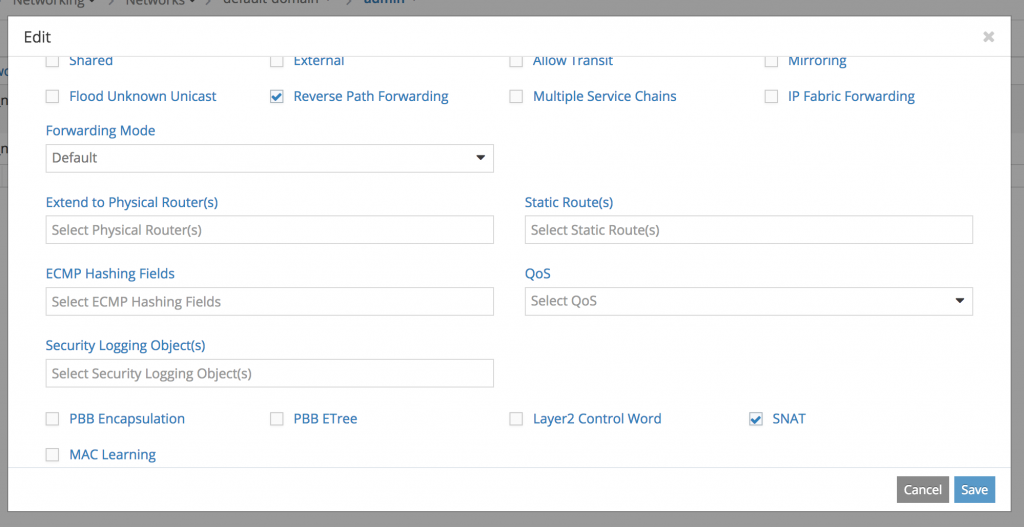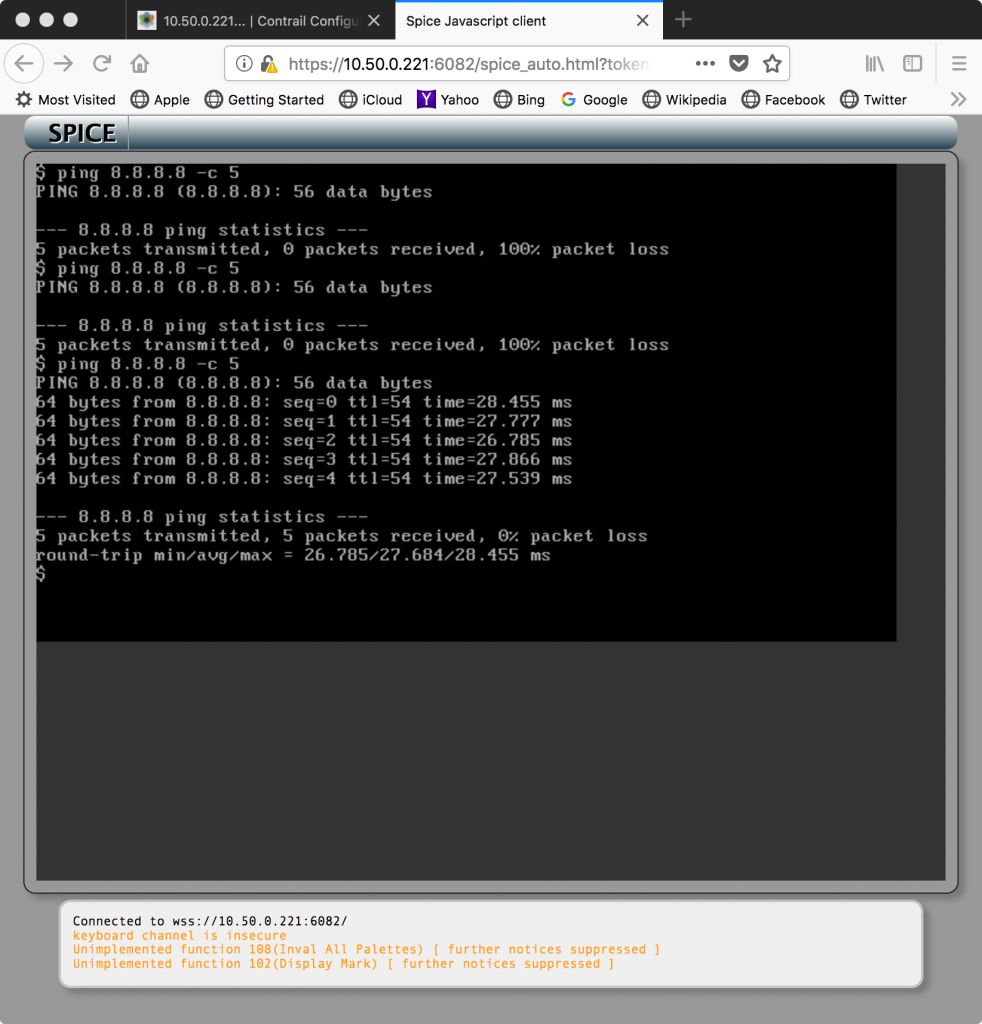Tungsten Fabric (formerly OpenContrail) is a multi-cloud, multi-stack software-defined solution sponsored by the Linux Foundation.
In a nutshell, Tungsten Fabric and Contrail, the commercial product based on TF, can replace and augment many of the networking components of a standard OpenStack cloud and provides features such as:
- Distributed virtual routing
- DHCP and Metadata services
- Policy-based access control
- Compatibility with security groups
- … and more
The forwarding plane supports MPLS over GRE, VXLAN, L2/L3 unicast and L3 multicast for interconnection between virtual and physical networks. A Tungsten Fabric architecture overview can be found at http://www.opencontrail.org/opencontrail-architecture-documentation/.
I’ve recently undertaken the challenge of integrating Tungsten Fabric into OpenStack-Ansible to ease the deployment of TF and associated OpenStack bits in a production-grade OpenStack cloud. This blog will cover, at a high-level, some patches to the master (Rocky) branch of OpenStack-Ansible as well as some tweaks to the contrail-ansible-deployer playbooks provided by Juniper and the TF community for deploying Tungsten Fabric. The process defined here is by no means meant as the final process, and is probably considered a bit clunky and less than ideal. But, it’s a start.
I will use the terms Tungsten Fabric, OpenContrail, and Contrail interchangably throughout this blog. My apologies in advance!
Requirements
A few weeks ago I deployed a standalone 3-node OpenContrail setup with an OpenStack-Ansible all-in-one node based on Queens. After figuring out some of the tweaks necessary to get things to a semi-working state, I decided to try my hand and deploying an AIO node that contained a single instance of Tungsten Fabric services as well as base OpenStack services.
The following minimum specs are recommended:
- System: Ubuntu VM
- OS: 16.04.4 LTS
- RAM: 48GB
- Disk: 300GB
- NIC: Single
A baremetal node may provide less complications, as I will point out later, but a virtual machine on ESXi or some other hypervisor should do the trick.
Getting started w/ OpenStack-Ansible
To get started, clone the OpenStack-Ansible repository. At time of writing, the master branch was tied to Rocky, the 18th release of OpenStack.
# git clone https://git.openstack.org/openstack/openstack-ansible /opt/openstack-ansible
# cd /opt/openstack-ansible
# git checkout master
# export ANSIBLE_ROLE_FETCH_MODE=git-clone
Next, run the bootstrapping scripts:
# scripts/bootstrap-ansible.sh
# scripts/bootstrap-aio.sh
The bootstrapping scripts will download the playbooks to deploy OpenStack, and will also prepare the networking on the machine to meet the OpenStack-Ansible architecture.
Role modifications
Making changes to an OpenStack cloud deployed with OpenStack-Ansible often means making changes to Ansible roles that make up the deployment. This includes changes to tasks, templates, variables, and more.
The roles I needed to modify include:
- os_neutron
- os_nova
Whether all of these role changes were necessary remains to be seen, but they’re here for your viewing pleasure.
os_neutron
Some new files include:
root@aio1:/etc/ansible/roles/os_neutron# git diff --staged
diff --git a/tasks/providers/opencontrail_config.yml b/tasks/providers/opencontrail_config.yml
new file mode 100644
index 0000000..8f5fc7d
--- /dev/null
+++ b/tasks/providers/opencontrail_config.yml
@@ -0,0 +1,99 @@
+---
+# Copyright 2018, Rackspace Hosting, Inc.
+#
+# Licensed under the Apache License, Version 2.0 (the "License");
+# you may not use this file except in compliance with the License.
+# You may obtain a copy of the License at
+#
+# http://www.apache.org/licenses/LICENSE-2.0
+#
+# Unless required by applicable law or agreed to in writing, software
+# distributed under the License is distributed on an "AS IS" BASIS,
+# WITHOUT WARRANTIES OR CONDITIONS OF ANY KIND, either express or implied.
+# See the License for the specific language governing permissions and
+# limitations under the License.
+
+- name: Set the packages to install
+ set_fact:
+ neutron_optional_combined_pip_packages: |-
+ {% set packages = neutron_optional_opencontrail_pip_packages %}
+ {{ packages }}
+
+- name: Install OpenContrail pip packages
+ pip:
+ name: "{{ neutron_optional_combined_pip_packages }}"
+ state: "{{ neutron_pip_package_state }}"
+ virtualenv: "{{ neutron_bin | dirname }}"
+ virtualenv_site_packages: "no"
+ extra_args: >-
+ {{ neutron_developer_mode | ternary(pip_install_developer_constraints | default('--constraint /opt/developer-pip-constraints.txt'), '') }}
+ {{ (pip_install_upper_constraints is defined) | ternary('--constraint ' + pip_install_upper_constraints | default(''),'') }}
+ {{ pip_install_options | default('') }}
+ register: install_packages
+ until: install_packages|success
+ retries: 5
+ delay: 2
+ tags:
+ - opencontrail-install
+ - opencontrail-pip-packages
+
+- name: Install git
+ apt:
+ name: git
+ state: present
+ delegate_to: "{{ item }}"
+ with_items:
+ - "{{ groups['neutron_server'] }}"
+ tags:
+ - opencontrail-install
+
+- name: Clone contrail neutron plugin
+ git:
+ repo: "{{ opencontrail_plugin_git_repo }}"
+ version: "{{ opencontrail_plugin_git_install_branch }}"
+ dest: /opt/contrail-neutron-plugin
+ force: yes
+ register: contrail_plugin_git_clone
+ delegate_to: "{{ item }}"
+ with_items:
+ - "{{ groups['neutron_server'] }}"
+ until: contrail_plugin_git_clone|success
+ retries: 5
+ delay: 2
+ tags:
+ - opencontrail-install
+
+# (jamesdenton) Will need to eventually compile and/or extract from Docker container
+# The tasks marked (temp) should be reworked
+
+- name: Download Contrail python libraries (temp)
+ vars:
+ - dlpath: https://github.com/busterswt/contrail-openstack/raw/master
+ get_url:
+ url: "{{ dlpath }}/{{ item }}"
+ dest: /opt
+ mode: 0440
+ with_items:
+ - contrail-openstack-neutron-init.tar
+ tags:
+ - opencontrail-install
+
+- name: Unpack Contrail python libraries (temp)
+ unarchive:
+ remote_src: yes
+ src: /opt/contrail-openstack-neutron-init.tar
+ dest: /openstack/venvs/neutron-{{ neutron_venv_tag }}/lib/python2.7/site-packages
+ when:
+ inventory_hostname == groups['neutron_server'][0]
+ tags:
+ - opencontrail-install
+
+- name: Install contrail neutron plugin into venv
+ command: "/openstack/venvs/neutron-{{ neutron_venv_tag }}/bin/python setup.py install"
+ args:
+ chdir: /opt/contrail-neutron-plugin
+ delegate_to: "{{ item }}"
+ with_items:
+ - "{{ groups['neutron_server'] }}"
+ tags:
+ - opencontrail-install
diff --git a/templates/plugins/opencontrail/ContrailPlugin.ini.j2 b/templates/plugins/opencontrail/ContrailPlugin.ini.j2
new file mode 100644
index 0000000..9d645b0
--- /dev/null
+++ b/templates/plugins/opencontrail/ContrailPlugin.ini.j2
@@ -0,0 +1,23 @@
+# {{ ansible_managed }}
+
+{% if neutron_plugin_type == 'opencontrail' %}
+[APISERVER]
+api_server_ip = {{ opencontrail_api_vip_address }}
+api_server_port = {{ opencontrail_api_vip_port }}
+multi_tenancy = True
+contrail_extensions = ipam:neutron_plugin_contrail.plugins.opencontrail.contrail_plugin_ipam.NeutronPluginContrailIpam,policy:neutron_plugin_contrail.plugins.opencontrail.contrail_plugin_policy.NeutronPluginContrailPolicy,route-table:neutron_plugin_contrail.plugins.opencontrail.contrail_plugin_vpc.NeutronPluginContrailVpc,contrail:None,service-interface:None,vf-binding:None
+
+[COLLECTOR]
+analytics_api_ip = {{ opencontrail_collector_vip_address }}
+analytics_api_port = {{ opencontrail_collector_vip_port }}
+
+[keystone_authtoken]
+auth_host = {{ internal_lb_vip_address }}
+auth_port = {{ keystone_service_port }}
+auth_protocol = {{ keystone_service_proto }}
+admin_user = {{ keystone_admin_user_name }}
+admin_password = {{ keystone_auth_admin_password }}
+admin_tenant_name = {{ keystone_admin_tenant_name }}
+insecure = True
+region_name = {{ keystone_service_region }}
+{% endif %}
Changes to existing files include:
root@aio1:/etc/ansible/roles/os_neutron# git diff
diff --git a/defaults/main.yml b/defaults/main.yml
index 162e933..7054c96 100644
--- a/defaults/main.yml
+++ b/defaults/main.yml
@@ -63,6 +63,8 @@ networking_bgpvpn_git_repo: https://git.openstack.org/openstack/networking-bgpvp
networking_bgpvpn_git_install_branch: master
openstack_ceilometer_git_repo: https://git.openstack.org/openstack/ceilometer
openstack_ceilometer_git_install_branch: master
+opencontrail_plugin_git_repo: https://github.com/Juniper/contrail-neutron-plugin
+opencontrail_plugin_git_install_branch: master
# Developer mode
neutron_developer_mode: false
@@ -164,6 +166,7 @@ neutron_sriov_nic_agent_ini_overrides: {}
neutron_sriov_nic_agent_init_overrides: {}
neutron_vpn_agent_init_overrides: {}
neutron_vpnaas_agent_ini_overrides: {}
+neutron_opencontrail_conf_ini_overrides: {}
###
### Quotas
@@ -434,3 +437,12 @@ ovs_nsh_support: False
# Set higher priority to mardim PPA when ovs_nsh_support is True
ovs_nsh_apt_pinned_packages: [{ package: "*", release: "LP-PPA-mardim-mardim-ppa"}]
+
+###
+### Contrail/OpenContrail/Tungsten Fabric Configuration
+###
+
+opencontrail_api_vip_address: "{{ external_lb_vip_address }}"
+opencontrail_api_vip_port: "8082"
+opencontrail_collector_vip_address: "{{ external_lb_vip_address }}"
+opencontrail_collector_vip_port: "8081"
diff --git a/templates/neutron.conf.j2 b/templates/neutron.conf.j2
index 83d25a7..dd755ca 100644
--- a/templates/neutron.conf.j2
+++ b/templates/neutron.conf.j2
@@ -42,6 +42,10 @@ core_plugin = {{ neutron_plugin_core }}
{% if neutron_plugin_type.split('.')[0] == 'ml2' %}
service_plugins = {{ neutron_plugin_loaded_base | join(',') }}
{% endif %}
+{% if neutron_plugin_type == 'opencontrail' %}
+service_plugins = neutron_plugin_contrail.plugins.opencontrail.loadbalancer.v2.plugin.LoadBalancerPluginV2
+api_extensions_path = /openstack/venvs/neutron-{{ neutron_venv_tag }}/lib/python2.7/site-packages/neutron_plugin_contrail/extensions:/openstack/venvs/neutron-{{ neutron_venv_tag }}/lib/python2.7/site-packages/neutron_lbaas/extensions
+{% endif %}
# MAC address generation for VIFs
base_mac = fa:16:3e:00:00:00
@@ -94,8 +98,9 @@ rpc_workers = {{ neutron_rpc_workers }}
{% set dhcp_agents_max = num_agent if num_agent > 2 else 2 %}
# DHCP
-{% if neutron_plugin_type == 'ml2.dragonflow' %}
-# In dragonflow, DHCP is fully distributed, and DHCP agents are not used
+{% if neutron_plugin_type == ('ml2.dragonflow' or 'opencontrail') %}
+# In dragonflow and opencontrail, DHCP is fully distributed and DHCP
+# agents are not used
dhcp_agent_notification = False
{% else %}
dhcp_agent_notification = True
diff --git a/vars/main.yml b/vars/main.yml
index cef4ee8..2d1c2a2 100644
--- a/vars/main.yml
+++ b/vars/main.yml
@@ -121,6 +121,10 @@ neutron_plugins:
plugin_ini: plugins/ml2/ml2_conf.ini
driver_interface: "openvswitch"
l3_agent_mode: "legacy"
+ opencontrail:
+ plugin_core: neutron_plugin_contrail.plugins.opencontrail.contrail_plugin.NeutronPluginContrailCoreV2
+ plugin_ini: plugins/opencontrail/ContrailPlugin.ini
+ plugin_conf_ini_overrides: "{{ neutron_opencontrail_conf_ini_overrides }}"
###
### ML2 Plugin Configuration
diff --git a/vars/source_install.yml b/vars/source_install.yml
index a246a45..24e57ea 100644
--- a/vars/source_install.yml
+++ b/vars/source_install.yml
@@ -96,6 +96,13 @@ neutron_proprietary_nuage_pip_packages:
- nuage-openstack-neutronclient
- nuagenetlib
+neutron_optional_opencontrail_pip_packages:
+ - bitarray
+ - bottle
+ - geventhttpclient
+ - psutil>=0.6.0
+ - requests>=1.1.0
+
neutron_developer_constraints:
- "git+{{ neutron_git_repo }}@{{ neutron_git_install_branch }}#egg=neutron"
- "git+{{ neutron_fwaas_git_repo }}@{{ neutron_fwaas_git_install_branch }}#egg=neutron-fwaas"
os_nova
root@aio1:/etc/ansible/roles/os_nova# git diff
diff --git a/defaults/main.yml b/defaults/main.yml
index 67d92e9..bc44511 100644
--- a/defaults/main.yml
+++ b/defaults/main.yml
@@ -325,6 +325,9 @@ nova_network_services:
calico:
use_forwarded_for: True
metadata_proxy_enabled: False
+ opencontrail:
+ use_forwarded_for: True
+ metadata_proxy_enabled: True
# Nova quota
nova_quota_cores: 20
HAproxy changes
In order to provide a single TF API and dashboard endpoint, I made a decision to create a VIP that would balance traffic amongst the TF API and analytics services. Whether this is best practice remains to be seen, but the changes to group_vars that facilitate VIP creation are here:
root@aio1:/opt/openstack-ansible# git diff
diff --git a/inventory/group_vars/haproxy/haproxy.yml b/inventory/group_vars/haproxy/haproxy.yml
index b837443..dc53ef4 100644
--- a/inventory/group_vars/haproxy/haproxy.yml
+++ b/inventory/group_vars/haproxy/haproxy.yml
@@ -36,6 +36,7 @@ haproxy_rabbitmq_management_whitelist_networks: "{{ haproxy_whitelist_networks }
haproxy_repo_git_whitelist_networks: "{{ haproxy_whitelist_networks }}"
haproxy_repo_cache_whitelist_networks: "{{ haproxy_whitelist_networks }}"
haproxy_opendaylight_whitelist_networks: "{{ haproxy_whitelist_networks }}"
+haproxy_opencontrail_whitelist_networks: "{{ haproxy_whitelist_networks }}"
haproxy_default_services:
- service:
@@ -365,3 +366,23 @@ haproxy_default_services:
haproxy_backend_httpcheck_options:
- expect status 405
haproxy_service_enabled: "{{ (groups['ceph-rgw'] is defined and groups['ceph-rgw'] | length > 0) or (ceph_rgws | length > 0) }}"
+ - service:
+ haproxy_service_name: opencontrail-api
+ haproxy_backend_nodes: "{{ groups['opencontrail-api_hosts'] | default([]) }}"
+ haproxy_bind: "{{ [opencontrail_api_vip_address] }}"
+ haproxy_port: 8082
+ haproxy_balance_type: tcp
+ haproxy_timeout_client: 5000s
+ haproxy_timeout_server: 5000s
+ haproxy_whitelist_networks: "{{ haproxy_opencontrail_whitelist_networks }}"
+ haproxy_service_enabled: "{{ neutron_plugin_type == 'opencontrail' }}"
+ - service:
+ haproxy_service_name: opencontrail-collector
+ haproxy_backend_nodes: "{{ groups['opencontrail-analytics_hosts'] | default([]) }}"
+ haproxy_bind: "{{ [opencontrail_collector_vip_address] }}"
+ haproxy_port: 8081
+ haproxy_balance_type: tcp
+ haproxy_timeout_client: 5000s
+ haproxy_timeout_server: 5000s
+ haproxy_whitelist_networks: "{{ haproxy_opencontrail_whitelist_networks }}"
+ haproxy_service_enabled: "{{ neutron_plugin_type == 'opencontrail' }}"
Some issues I ran into with this approach on an all-in-one include the ability for HAproxy to bind the VIP to port 8081. Turns out that later on in the process, the Contrail playbooks create a listener on 0.0.0.0:8081 that keeps the VIP from binding on the same port. An alternative here would be to comment out that service, or disable it once HAproxy is deployed. For a multi-node installation where HAproxy is on a different node, it can remain. Load balancing these two services may not work out in the end, but I’ll leave it for now.
Environment changes
The default Neutron env.d skeleton will deploy Neutron agent containers that are not necessary as part of the deployment. By overriding the default, we can remove the agent containers and define a few new components:
cat <<'EOF' >> /etc/openstack_deploy/env.d/neutron.yml
component_skel:
neutron_server:
belongs_to:
- neutron_all
opencontrail_vrouter:
belongs_to:
- neutron_all
opencontrail_api:
belongs_to:
- neutron_all
opencontrail_analytics:
belongs_to:
- neutron_all
container_skel:
neutron_agents_container:
contains: {}
opencontail-vrouter_container:
belongs_to:
- compute_containers
contains:
- opencontrail_vrouter
properties:
is_metal: true
opencontrail-api_container:
belongs_to:
- opencontrail-api_containers
contains:
- opencontrail_api
properties:
is_metal: true
opencontrail-analytics_container:
belongs_to:
- opencontrail-analytics_containers
contains:
- opencontrail_analytics
properties:
is_metal: true
neutron_server_container:
belongs_to:
- network_containers
contains:
- neutron_server
physical_skel:
opencontrail-api_containers:
belongs_to:
- all_containers
opencontrail-api_hosts:
belongs_to:
- hosts
opencontrail-analytics_containers:
belongs_to:
- all_containers
opencontrail-analytics_hosts:
belongs_to:
- hosts
EOF
I am not entirely sure at this point if those will all be necessary and if that’s the proper approach, but it’s there for now.
In the openstack_user_config.yml file I defined two new groups with the intention of being able to split out API and Analytics services across hosts. Since this is an AIO, the same IP is defined:
opencontrail-api_hosts:
aio1:
ip: 172.29.236.100
opencontrail-analytics_hosts:
aio1:
ip: 172.29.236.100
Overrides
Changes to the os_neutron role resulted in new defaults being added and some overrides being required. In user_variables.yml the following was added:
neutron_plugin_type: opencontrail
neutron_driver_quota: neutron_plugin_contrail.plugins.opencontrail.quota.driver.QuotaDriver
opencontrail_plugin_git_install_branch: R5.0
Some defaults specified in the role include:
opencontrail_api_vip_address: "{{ external_lb_vip_address }}"
opencontrail_api_vip_port: "8082"
opencontrail_collector_vip_address: "{{ external_lb_vip_address }}"
opencontrail_collector_vip_port: "8081"
opencontrail_plugin_git_repo: https://github.com/Juniper/contrail-neutron-plugin
opencontrail_plugin_git_install_branch: master
neutron_opencontrail_conf_ini_overrides: {}
The final requirements are yet to be determined.
Running the OpenStack-Ansible playbooks
At this point, most of the changes required to OpenStack-Ansible playbooks have been made and OpenStack can be deployed:
# cd /opt/openstack-ansible/playbooks
# openstack-ansible setup-hosts.yml
# openstack-ansible setup-infrastructure.yml
# openstack-ansible setup-openstack.yml
While Neutron will be laid down, some additional changes will need to be made and Contrail deployed before networking can be used. Horizon can be used but may not be fully-functional.
Next, we must perform some actions that include cloning the Juniper ansible playbook repo, setting up overrides, and running those playbooks to install Contrail and overlay some Docker containers for Contrail-related services.
Deploying Tungsten Fabric / OpenContrail / Contrail
At this point of the process, OpenStack has been deployed and is aware of the implemented networking backend but the backend doesn’t exist. Juniper provides playbooks that can deploy OpenContrail using Docker containers. Those same playbooks can also deploy an OpenStack release based on Kolla, another OpenStack deployment strategy. We really only need the Contrail-related bits here.
To implement a few changes, I cloned the repo and pushed the required changes needed to deploy on top of an OpenStack-Ansible based cloud.
Clone the repo:
# git clone http://github.com/busterswt/contrail-ansible-deployer /opt/openstack-ansible/playbooks/contrail-ansible-deployer
# cd /opt/openstack-ansible/playbooks/contrail-ansible-deployer
# git checkout osa
Overrides
The Juniper playbooks rely on their own inventory and overrides, so performing these next few steps may feel a bit redundant. I have not yet reworked the playbooks to utilize the inventory in place for OpenStack-Ansible.
These overrides can be defined in a new file at /etc/openstack_deploy/user_opencontrail_vars.yml:
config_file: /etc/openstack_deploy/user_opencontrail_vars.yml
opencontrail_api_vip_address: ""
opencontrail_collector_vip_address: ""
provider_config:
bms:
ssh_pwd:
ssh_user: root
ssh_public_key: /root/.ssh/id_rsa.pub
ssh_private_key: /root/.ssh/id_rsa
ntpserver: 129.6.15.28
instances:
aio1:
provider: bms
ip: 172.29.236.100
roles:
config_database:
config:
control:
analytics_database:
analytics:
webui:
vrouter:
VROUTER_GATEWAY: 10.50.0.1
PHYSICAL_INTERFACE: ens160
global_configuration:
CONTAINER_REGISTRY: opencontrailnightly
# CONTAINER_REGISTRY: hub.juniper.net/contrail
# CONTAINER_REGISTRY_USERNAME:
# CONTAINER_REGISTRY_PASSWORD:
contrail_configuration:
CLOUD_ORCHESTRATOR: openstack
CONTRAIL_VERSION: latest
# CONTRAIL_VERSION: 5.0.0-0.40
# UPGRADE_KERNEL: true
UPGRADE_KERNEL: false
KEYSTONE_AUTH_HOST: ""
KEYSTONE_AUTH_PUBLIC_PORT: 5000
KEYSTONE_AUTH_PROTO: http
KEYSTONE_AUTH_URL_VERSION:
KEYSTONE_AUTH_ADMIN_USER: admin
KEYSTONE_AUTH_ADMIN_PASSWORD: ""
KEYSTONE_AUTH_URL_VERSION: /v3
CONTROLLER_NODES: 172.29.236.100
CONTROL_NODES: 172.29.236.100
ANALYTICSDB_NODES: 172.29.236.100
WEBUI_NODES: 172.29.236.100
ANALYTICS_NODES: 172.29.236.100
CONFIGDB_NODES: 172.29.236.100
CONFIG_NODES: 172.29.236.100
Take special note of the following key/value pairs:
VROUTER_GATEWAY: 10.50.0.1
PHYSICAL_INTERFACE: ens160
CONTAINER_REGISTRY: opencontrailnightly
# CONTAINER_REGISTRY: hub.juniper.net/contrail
# CONTAINER_REGISTRY_USERNAME:
# CONTAINER_REGISTRY_PASSWORD:
CONTRAIL_VERSION: latest
# CONTRAIL_VERSION: 5.0.0-0.40
CONTROLLER_NODES: 172.29.236.100
CONTROL_NODES: 172.29.236.100
ANALYTICSDB_NODES: 172.29.236.100
WEBUI_NODES: 172.29.236.100
ANALYTICS_NODES: 172.29.236.100
CONFIGDB_NODES: 172.29.236.100
CONFIG_NODES: 172.29.236.100
The first section defines the “physical” interface that will be repurposed/leveraged by the vhost0 interface required for vRouter. This being an all-in-one node with a single NIC means chances are good the playbooks will automatically determine which interface to use. However, I’ve gone ahead and called it out here. The IP address of this host is 10.50.0.221 and the gateway is 10.50.0.1. For a multi-homed host, it may be possible to dedicate an interface to the vRouter along with its own gateway address. I have yet to do a multi-NIC deploy, but look forward to that being the case.
The second section defines the Docker registry from which the containers will be downloaded. The opencontailnightly registry contains containers that are build every one to two days, and may or may not work on any given day. If you have access to the GA registry through Juniper, you can define that registry instead and provide access credentials. The only version available on the nightly registry is latest, while the Juniper registry may have tagged releases. Use what’s appropriate.
The third section defines address for the respective node types, and are used throughout the playbooks to plug values into templates. These are currently required for the playbooks to complete successfully. Note that I’ve used the ‘CONTAINER_NET’ address here. The idea is that Contrail and OpenStack would communicate on the existing container network used by LXC. In this AIO, 172.29.236.100 is the IP configured on br-mgmt, and happens to also be the internal VIP address. Services deployed in Docker containers will bind ports to this IP for their respective service. How this changes in a multi-node install remains TBD.
OSA repo changes
OpenStack-Ansible includes a repo server for package management that currently inhibits the installation of certain versions of packages needed to deploy OpenContrail. Here I’ve disabled the use of the internal repo server by modifying /root/.pip/pip.conf:
[global]
disable-pip-version-check = true
timeout = 120
#index-url = http://172.29.236.100:8181/simple
#trusted-host =
# 172.29.236.100
[install]
upgrade = true
upgrade-strategy = only-if-needed
pre = true
Running the playbooks
At this point, we should be in a good spot to begin running the Contrail playbooks.
First, the node(s) must be bootstrapped:
# cd /opt/openstack-ansible/playbooks/
# openstack-ansible -e orchestrator=openstack contrail-ansible-deployer/playbooks/configure_instances.yml
When UPGRADE_KERNEL is true, the host may reboot. If this happens, just rerun the playbook again. When the Contrail nodes are not the deploy host, the playbooks have a timer that waits for the host(s) to return.
Next, run the install_contrail.yml playbook to deploy OpenContrail:
# cd /opt/openstack-ansible/playbooks/
# openstack-ansible -e orchestrator=openstack contrail-ansible-deployer/playbooks/install_contrail.yml
Install additional components
Because the Juniper playbooks expect a Kolla-based deployment, some of the components are not installed on top of our OpenStack-Ansible based cloud. I’ve taken the liberty of extracting some utilities, modules, and more from Docker containers and wrote a playbook to lay those down:
# cd /opt/openstack-ansible/playbooks/
# openstack-ansible contrail-ansible-deployer/playbooks/install_contrailtools.yml
Reboot
Once OpenContrail has been deployed and the vRouter kernel module compiled and inserted, it may be necessary to reboot the host to clear up some issues encounted inside the vRouter agent container, including:
contrail-vrouter-agent: controller/src/vnsw/agent/vrouter/ksync/ksync_memory.cc:107: void KSyncMemory::Mmap(bool): Assertion `0' failed.
/entrypoint.sh: line 304: 28142 Aborted (core dumped) $@
I found that rebooting the host post-install was enough for the issue to go away.
Post-Deploy
Now that OpenContrail is (hopefully) installed, use the contrail-status command to check the status of the services:
root@aio1:/opt/openstack-ansible/playbooks# contrail-status
Pod Service Original Name State Status
analytics api contrail-analytics-api running Up 21 minutes
analytics collector contrail-analytics-collector running Up 21 minutes
analytics nodemgr contrail-nodemgr running Up 21 minutes
analytics query-engine contrail-analytics-query-engine running Up 21 minutes
config api contrail-controller-config-api running Up 24 minutes
config cassandra contrail-external-cassandra running Up 27 minutes
config device-manager contrail-controller-config-devicemgr running Up 24 minutes
config nodemgr contrail-nodemgr running Up 24 minutes
config rabbitmq contrail-external-rabbitmq running Up 27 minutes
config schema contrail-controller-config-schema running Up 24 minutes
config svc-monitor contrail-controller-config-svcmonitor running Up 24 minutes
config zookeeper contrail-external-zookeeper running Up 27 minutes
control control contrail-controller-control-control running Up 23 minutes
control dns contrail-controller-control-dns running Up 23 minutes
control named contrail-controller-control-named running Up 23 minutes
control nodemgr contrail-nodemgr running Up 23 minutes
database cassandra contrail-external-cassandra running Up 22 minutes
database nodemgr contrail-nodemgr running Up 22 minutes
database zookeeper contrail-external-zookeeper running Up 22 minutes
vrouter agent contrail-vrouter-agent running Up 19 minutes
vrouter nodemgr contrail-nodemgr running Up 19 minutes
webui job contrail-controller-webui-job running Up 23 minutes
webui web contrail-controller-webui-web running Up 23 minutes
vrouter kernel module is PRESENT
== Contrail control ==
control: active
nodemgr: active
named: active
dns: active
== Contrail database ==
nodemgr: active
zookeeper: active
cassandra: active
== Contrail analytics ==
nodemgr: active
api: initializing (UvePartitions:UVE-Aggregation[Partitions:0] connection down)
collector: initializing (KafkaPub:172.29.236.100:9092 connection down)
query-engine: active
== Contrail webui ==
web: active
job: active
== Contrail vrouter ==
nodemgr: active
agent: active
== Contrail config ==
api: active
zookeeper: active
svc-monitor: active
nodemgr: active
device-manager: active
cassandra: active
rabbitmq: active
schema: active
If you see nodemgr services in an Initializing state with (NTP state unsynchronized.), try restarting NTP on the host. It may be necessary to define multiple NTP servers. I have not yet worked out the Analytics issues, but hope to resolve that soon.
Issues
I’d like to say that things are completely working at this point, but they’re not! Using the openstack or neutron clients may fail to work, as the neutron-server service is likely failing with the following error:
Unrecoverable error: please check log for details.: ExtensionsNotFound: Extensions not found: ['route-table']. Related to WARNING neutron.api.extensions [-] Extension file vpcroutetable.py wasn't loaded due to cannot import name attributes.
In Rocky, one of the deprecated modules that the Contrail plugin replies has finally been removed. Fret not, as it was rolled into another module/file.
In the neutron_server container, I modified the /openstack/venvs/neutron-18.0.0.0b3/lib/python2.7/site-packages/neutron_plugin_contrail/extensions/vpcroutetable.py file like so:
-from neutron.api.v2 import attributes as attr
+from neutron_lib.api import attributes as attr
A restart of the neutron-server service is needed:
# systemctl restart neutron-server
Testing
To validate that OpenContrail has been configured to utilize Keystone authentication, open up the Contrail UI in a browser using the external VIP address and port 8143:
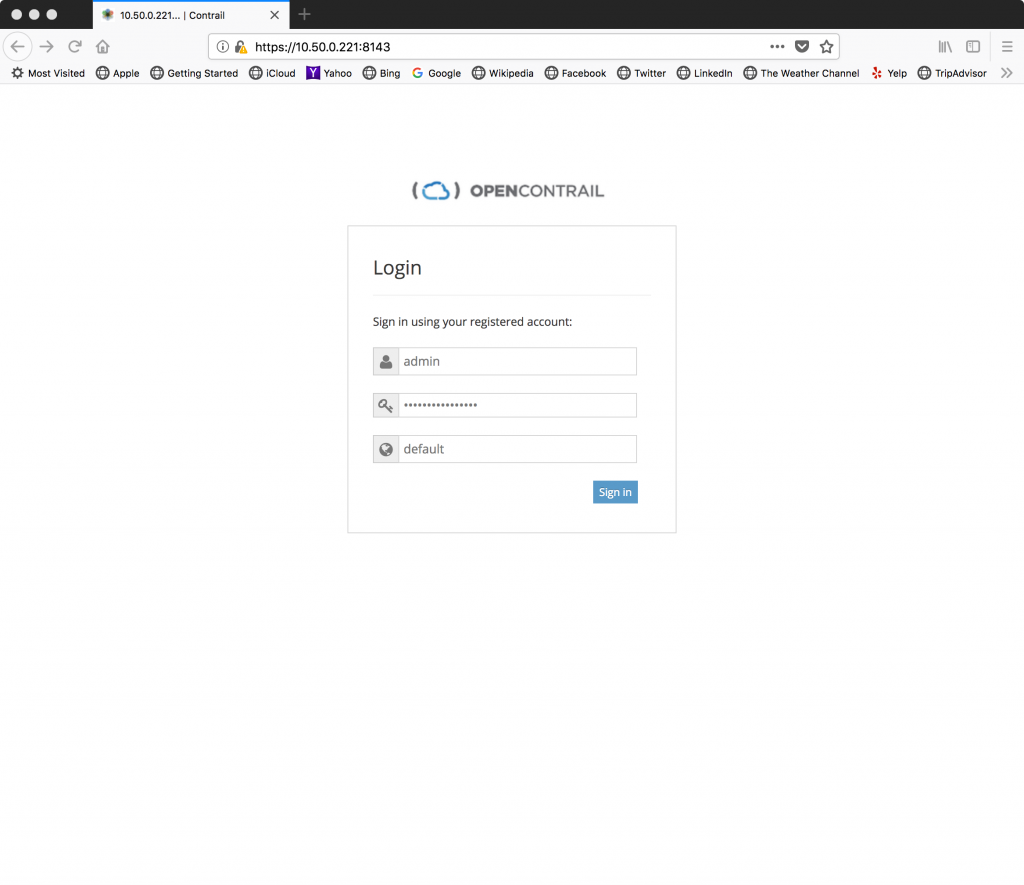 Specify the
Specify the admin user and the password defined in the openrc file. The domain is default. If authentication is successful, the dashboard should appear:
Switching back to OpenStack, we can perform an openstack network list to see the networks:
root@aio1-utility-container-ee37a935:~# openstack network list
+--------------------------------------+-------------------------+---------+
| ID | Name | Subnets |
+--------------------------------------+-------------------------+---------+
| 723e67c1-8ccd-43ba-a6f4-8b2399c1b8d2 | __link_local__ | |
| 5a2947ce-0030-4d2a-a06a-76b0d6934102 | ip-fabric | |
| 5f4b0153-8146-4e9c-91d4-c60364ece6bc | default-virtual-network | |
+--------------------------------------+-------------------------+---------+
Those networks were all created by the Contrail plugin/driver and should not be removed.
Create a test network:
root@aio1-utility-container-ee37a935:~# openstack network create test_network_green
+---------------------------+--------------------------------------+
| Field | Value |
+---------------------------+--------------------------------------+
| admin_state_up | UP |
| availability_zone_hints | None |
| availability_zones | None |
| created_at | None |
| description | None |
| dns_domain | None |
| id | d9e0507f-5ef4-4b62-bf69-176340095053 |
| ipv4_address_scope | None |
| ipv6_address_scope | None |
| is_default | None |
| is_vlan_transparent | None |
| mtu | None |
| name | test_network_green |
| port_security_enabled | True |
| project_id | e565909917a5463b867c5a7594a7612f |
| provider:network_type | None |
| provider:physical_network | None |
| provider:segmentation_id | None |
| qos_policy_id | None |
| revision_number | None |
| router:external | Internal |
| segments | None |
| shared | False |
| status | ACTIVE |
| subnets | |
| tags | |
| updated_at | None |
+---------------------------+--------------------------------------+
Notice the provider attributes are not specified. These are no longer important to us. Other attributes may not be supported by the Contrail plugin.
Create the subnet:
root@aio1-utility-container-ee37a935:~# openstack subnet create --subnet-range 172.23.0.0/24 --network test_network_green test_subnet_green
+-------------------+--------------------------------------+
| Field | Value |
+-------------------+--------------------------------------+
| allocation_pools | 172.23.0.2-172.23.0.254 |
| cidr | 172.23.0.0/24 |
| created_at | None |
| description | None |
| dns_nameservers | |
| enable_dhcp | True |
| gateway_ip | 172.23.0.1 |
| host_routes | |
| id | cc2d2f56-5c87-49fb-afd5-14e32feccd6a |
| ip_version | 4 |
| ipv6_address_mode | None |
| ipv6_ra_mode | None |
| name | test_subnet_green |
| network_id | d9e0507f-5ef4-4b62-bf69-176340095053 |
| project_id | e565909917a5463b867c5a7594a7612f |
| revision_number | None |
| segment_id | None |
| service_types | None |
| subnetpool_id | None |
| tags | |
| updated_at | None |
+-------------------+--------------------------------------+
IPv6 should be supported, but I ran into issues trying to create an IPv6 subnet. At this point, our network is ready for VMs. For good measure, I created a security group that could be applied to our instance that would allow SSH:
root@aio1-utility-container-ee37a935:~# openstack security group create allow_ssh
+-----------------+--------------------------------------+
| Field | Value |
+-----------------+--------------------------------------+
| created_at | None |
| description | allow_ssh |
| id | 39a9e241-27c3-452a-b37a-80b6dcbbf783 |
| name | allow_ssh |
| project_id | e565909917a5463b867c5a7594a7612f |
| revision_number | None |
| rules | |
| tags | [] |
| updated_at | None |
+-----------------+--------------------------------------+
root@aio1-utility-container-ee37a935:~# openstack security group rule create --dst-port 22 allow_ssh
+-------------------+--------------------------------------+
| Field | Value |
+-------------------+--------------------------------------+
| created_at | None |
| description | None |
| direction | ingress |
| ether_type | IPv4 |
| id | b8393e4d-1d9d-47e9-877e-86374f38dca1 |
| name | None |
| port_range_max | 22 |
| port_range_min | 22 |
| project_id | e565909917a5463b867c5a7594a7612f |
| protocol | tcp |
| remote_group_id | None |
| remote_ip_prefix | 0.0.0.0/0 |
| revision_number | None |
| security_group_id | 39a9e241-27c3-452a-b37a-80b6dcbbf783 |
| updated_at | None |
+-------------------+--------------------------------------+
I then booted the instance using a tiny flavor and a CirrOS image:
root@aio1-utility-container-ee37a935:~# openstack server create --image cirros --flavor test_flavor --nic net-id=test_network_green --security-group allow_ssh test1
+-------------------------------------+----------------------------------------------------+
| Field | Value |
+-------------------------------------+----------------------------------------------------+
| OS-DCF:diskConfig | MANUAL |
| OS-EXT-AZ:availability_zone | |
| OS-EXT-SRV-ATTR:host | None |
| OS-EXT-SRV-ATTR:hypervisor_hostname | None |
| OS-EXT-SRV-ATTR:instance_name | |
| OS-EXT-STS:power_state | NOSTATE |
| OS-EXT-STS:task_state | scheduling |
| OS-EXT-STS:vm_state | building |
| OS-SRV-USG:launched_at | None |
| OS-SRV-USG:terminated_at | None |
| accessIPv4 | |
| accessIPv6 | |
| addresses | |
| adminPass | a8tghwSoTWZP |
| config_drive | |
| created | 2018-06-18T14:34:49Z |
| flavor | test_flavor (5c0600b7-f9fe-46f3-8af5-f8390ee5c6f3) |
| hostId | |
| id | b14d1861-8855-4d17-a2d3-87eb67a3d81c |
| image | cirros (4006fd58-cdc5-4bd8-bc25-ef73be1cd429) |
| key_name | None |
| name | test1 |
| progress | 0 |
| project_id | e565909917a5463b867c5a7594a7612f |
| properties | |
| security_groups | name='39a9e241-27c3-452a-b37a-80b6dcbbf783' |
| status | BUILD |
| updated | 2018-06-18T14:34:49Z |
| user_id | f6aac1aa53294659998aa71838133a1d |
| volumes_attached | |
+-------------------------------------+----------------------------------------------------+
root@aio1-utility-container-ee37a935:~# openstack server list
+--------------------------------------+-------+--------+-------------------------------+--------+-------------+
| ID | Name | Status | Networks | Image | Flavor |
+--------------------------------------+-------+--------+-------------------------------+--------+-------------+
| b14d1861-8855-4d17-a2d3-87eb67a3d81c | test1 | ACTIVE | test_network_green=172.23.0.3 | cirros | test_flavor |
+--------------------------------------+-------+--------+-------------------------------+--------+-------------+
Now, I could attach to the instance’s console and attempt outbound connectivity:
Within the Contrail UI, I was able to enable snat on the network to allow the vRouter to snat outbound connections from the VM:
A quick test showed ping working:
Inbound connections to the VM are also possible, but require some additional work within Contrail to advertise the VMs address. I have a Cisco ASA 1001 in my lab that has been configured to peer with the Contrail controller, but will have to save that configuration demonstration for another day.
Summary
There is still a lot of work to do to not only learn how Tungsten Fabric / OpenContrail / Contrail operates, but to also construct best practices around how it should be deployed within an OpenStack-Ansible based cloud. Some of the components used for the installation are heavily wrapped up in Docker containers and had to be extracted before deploying in the LXC container and/or the host(s). This isn’t scalable, but is good enough for now.
I ran into issues with the opencontrailnightly build recently, in that the vRouter was dropping outbound or response traffic from my VM. Resorting to a GA build from Juniper’s repo solved the issue, but not everyone may have that access.
Another problem I encountered was that while pings to/from the VM worked (with the ASR bits in place), SSH connections failed. In fact, any TCP connection failed. The SYNs were seen at the instance, and SYN/ACK was observed going out. However, the SYN/ACK never made it past the vRouter. A packet capture showed that the SYN/ACK had an invalid checksum. Disabling generic IP checksums on the “physical” interface of the host, ens160 in this case, allowed things to work. This article was super helpful:
https://kb.juniper.net/InfoCenter/index?page=content&id=KB30500
As I get more reps with this I hope to simplify the process and one day get this moved upstream for inclusion into OpenStack-Ansible. Until then, good luck!
- Integrating Tungsten Fabric with OpenStack-Ansible - July 13, 2018

)
